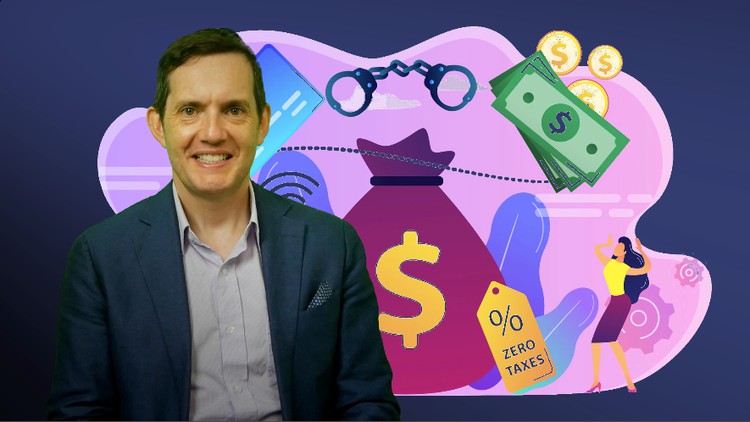Financial Crime: Processes & Technology - Masterclass
- Description
- Curriculum
- FAQ
- Reviews
- Grade

The only Financial Crime course on Udemy where you’ll learn the in depth skills that are a must have for working in Financial Crime.
In 10+ hours, you’ll learn specialised skills, that are in high demand and hard to find across Anti Money Laundering (AML), Counter Terrorism Financing (CTF), Customer Identification, Sanctions, Politically Exposed Persons and Fraud (including External and Employee fraud).
This course is suitable for anyone looking to become a KYC analyst, Compliance manager, Financial Crime analytics specialist…Or you may be looking to broaden out your existing financial services, risk, compliance, technology and analytics experience.
Either way, this is the only course you need if you are serious about learning about financial crime from someone who has led teams implementing financial crime processes, technology…and running financial crime operations teams.
Averaging an excellent 4.5+ star rating on Udemy, I am an experienced (20+ years of risk, technology and digital expertise) and in demand instructor who offers engaging, informative, and fun courses.
You’ll find plenty of geeky humour along with lots of explanations and animations to make sure everything is easy to understand
Plus…You’ll save over $10,000 by enrolling, because that’s what it costs (at a minimum) to learn the specialist financial crime processes and technology knowledge I teach that are offered through formal degrees, and specialist certification programs.
Why spend any more than you have to?
This is the most comprehensive Financial Crime course you’ll find on Udemy. I provide you with step by step knowledge across:
-
Understanding the fundamentals of financial crime – from money laundering, terrorism financing, fraud, sanctions, corruption and bribery and cybercrime.
-
Real life examples of financial crime (including typologies) and the vulnerabilities that criminals were able to exploit
-
Transaction Monitoring – including understanding the functionality, how to create transaction monitoring scenarios through to fine tuning Transaction Monitoring Systems (TMS) and using sandboxes to ensure operational efficiencies.
-
KYC – from customer identification, Customer Due Diligence (CDD), Enhanced Due Diligence (EDD) processes through to KYC technology functionality and use cases. I also cover Correspondent Banking too.
-
Politically Exposed Persons (PEPs) – from the processes through to name filtering technology that process millions of customer records ever day.
-
Sanctions – from the obligations, the lists (like OFAC – SDN) through to the processes and technologies that banks use every day to screen millions of transactions real time.
-
Fraud – whether it’s external fraud like card fraud, or application fraud through to employee fraud (including expenses fraud, ghosting and defrauding of customers).
I’ve got you covered with the detection processes that banks use, and how technology like transaction monitoring and application fraud detection are essential.
Sign up today and say ‘YES’ to:
-
Engaging animated video lectures from a slightly quirky instructor (just letting you know in advance!)
-
Quizzes & Challenging assignments
-
Downloadable lecture summaries
-
Heaps of specially curated resources that will keep you interested and learning
-
$8,000+ worth of financial crime course materials and course curriculum
-
A completion certificate that you can share with any employer
This is the most comprehensive Financial Crime course you’ll find on Udemy. I provide you with step by step knowledge across:
-
Understanding the fundamentals of financial crime – from money laundering, terrorism financing, fraud, sanctions, corruption and bribery and cybercrime.
-
Real life examples of financial crime (including typologies) and the vulnerabilities that criminals were able to exploit
-
Transaction Monitoring – including understanding the functionality, how to create transaction monitoring scenarios through to fine tuning Transaction Monitoring Systems (TMS) and using sandboxes to ensure operational efficiencies.
-
KYC – from customer identification, Customer Due Diligence (CDD), Enhanced Due Diligence (EDD) processes through to KYC technology functionality and use cases. I also cover Correspondent Banking too.
-
Politically Exposed Persons (PEPs) – from the processes through to name filtering technology that process millions of customer records ever day.
-
Sanctions – from the obligations, the lists (like OFAC – SDN) through to the processes and technologies that banks use every day to screen millions of transactions real time.
-
Fraud – whether it’s external fraud like card fraud, or application fraud through to employee fraud (including expenses fraud, ghosting and defrauding of customers).
I’ll see you inside.
-
3What Is Financial Crime?
Understanding financial crime is an important foundation as a part of this course. Before breaking off an getting into each component of financial crime, let's explore the essence of financial crime.
-
4Let's Explore Money Laundering
A key component in financial crime, money laundering is a continual challenge that financial services companies face into. In this lecture, we'll explore money laundering, it's impact and the 3 stages of money laundering.
-
5Money Laundering Examples
Let's get into some examples / typologies with money laundering so you can see how exactly money launderers will go about laundering criminal proceeds.
-
6Financial Crime & Money Laundering
Time to test your knowledge of financial crime!
-
7Trade Based Money Laundering
Trade Based Money Laundering (TBML) is a highly valued money laundering technique used by professional and experienced money launderers. In this lecture you'll hear from Financial Intelligence Unit (FIU) experts from around the World sharing their current insights and observations on TBML.
-
8Let's Explore Terrorism Financing
You probably know about terrorist organizations like Al Qaeda and ISIS. In order for these organizations to survive, they require one thing: money. In this lecture, we'll explore terrorism financing and how terrorist financiers go about supporting terrorist causes.
-
9Terrorism Financing Examples
In this lecture I'll take you through real examples of how terrorist financing is executed.
-
10Let's Explore Fraud
Fraud is more commonplace than you may imagine...and I'm sure you may yourself have even been a victim of fraud, whether it's card fraud or digital banking fraud. Let's explore fraud, what it is and the impacts it has on victims.
-
11Fraud Examples
In this lecture I'll take you through some of the techniques used by criminals to execute fraud.
-
12Terrorism Financing & Fraud
Time to test your knowledge of financial crime!
-
13Let's Explore Sanctions
Sanctions are complex, but they have an important role in global politics to ensure matters of international concern are dealt with to stop or minimise their consequences. In this lecture, I'll take you through what sanctions are all about and the types of sanctions you are likely to encounter in financial crime.
-
14Sanctions Examples
In this lecture I'll take you through examples where sanctions have been utilised, and financial services companies failed to comply. The consequences have been very costly and highly damaging to the reputation of organizations.
-
15Sanctions
Time to test your knowledge!
-
16Understanding Banking Systems
Before deep diving into transaction monitoring, it's important to understand how systems typically work in a bank. In this lecture, I'll walk you through knowledge I cover off in more detail in one of my other courses here on Udemy: Digital Banking - Masterclass & Introduction to Fintech, to explain at a high level how banking systems work and the interaction of these systems.
-
17What Is Transaction Monitoring?
Banks globally process billions and billions of transactions every year. Identifying when suspicious or unusual customer activity is happening relies on one key capability in financial crime: transaction monitoring. In this lecture we'll explore exactly what transaction monitoring is, and how the the technology works.
-
18Banking Systems & Transaction Monitoring
Time to test your knowledge of financial crime!
-
19Transaction Monitoring Scenarios
At the heart of transaction monitoring, are specialist teams dedicated to creating transaction monitoring scenarios to identify unusual activity. In this lecture I'll take you transaction monitoring scenarios, including their purpose and demonstrate how to create a transaction monitoring scenario. This knowledge is essential for anyone working in financial crime analytics or operations!
-
20AML Transaction Monitoring Tuning
In a course like this, it's important to get access to thought leaders in financial crime so you aren't just hearing from one person (me!) on financial crime processes and technology. The more exposure you have to a variety of insights and perspectives, the more robust your skills and knowledge will be. Join me in this lecture as we hear from an expert in TMS, on how to optimise and fine tune transaction monitoring scenarios. This lecture will help consolidate your knowledge on scenarios and how to make them operationally efficient.
-
21Sandboxes
Sandboxes are an essential capability that financial crime teams working in transaction monitoring, name filtering and transaction filtering use to create operational effectiveness. Join me in this lecture where I take you through sandboxes and the functionality typically offered.
-
22Transaction Monitoring Scenarios, Tuning & Sandboxes
Time to test your knowledge of financial crime!
-
23Understanding KYC
When you hear AML (Anti Money Laundering)...the first thing that may come to mind is KYC. We generally all experience some form of KYC related questions when we onboard with a financial services company. In this lecture I'll introduce you to KYC before we get into more depth on key components like: Customer identification as a part of this section of the course.
-
24Understanding Customer Identification
Identifying your customers as a bank is vital. Not only because you need to ensure know who they are in case they are involved in criminal activities later on, but also because you want to provide fraudsters using fake identities from getting in the front door. In this lecture I'll explore the fundamentals of customer identification.
-
25KYC & Customer Identification
Time to test your knowledge of financial crime!
-
26Understanding Customer Due Diligence
The second component of KYC, Customer Due Diligence is important for understanding the nature and activities of a customer's relationship with a financial services company, along with their source of funds. In this lecture I'll explore these concepts in more depth.
-
27Customer Identification Processes
You know that customer identification is important, and an obligation that banks have under KYC requirements. In this lecture I'll explore the processes banks apply to customer identification to ensure they know who it is they are dealing with.
-
28Customer Due Diligence Processes
The next process to deep dive in is Customer Due Diligence (CDD). In this lecture we'll explore the processes that banks apply to meet their CDD obligations, and ensure they really understand the nature of a customer's relationship with a bank.
-
29Customer Due Diligence Webinar
Continuing that theme of providing students with a diversity of sources to learn about financial crime in this course, join me as we hear about the practical application of CDD and jurisdictional level processes. This webinar will help consolidate your knowledge of CDD and understand the hands on steps that banks need to go through.
-
30CDD Assignment
-
31CDD and Customer Identification Processes
Time to test your knowledge of financial crime!
-
32KYC Technology
With a good understanding of Customer Identification and CDD under your belt, now it's time to join the dots and understand how KYC technology can support the processes that Customer Identification and CDD need to perform.
-
33PEPs & Processes
PEPs or Politically Exposed Persons, are fascinating. Whether it's foreign PEPs or domestic PEPs, in this lecture you'll learn about them, why they are a higher financial crime risk, and the processes banks must apply to identify and manage their PEP risks.
-
34PEP Filtering Technology
Taking your knowledge of PEPs to the next level, in this lecture I'll take you through the application of name filtering to achieving compliance with PEP related obligations.
-
35KYC For Correspondent Banking
KYC isn't just about individual and business customers. It also involves Correspondent Banking. Never heard of Correspondent Banking? Never fear...I've got you covered in this lecture!
-
36KYC Technology, PEPs, EP Filtering Technology & Correspondent Banking
Time to test your knowledge of financial crime!
-
37Sanctions Filtering
Iran. North Korea. Nuclear weapons. Weapons of mass destruction. All terms you are no doubt familiar with. Well in financial crime, banks invest significantly to ensure they are on the forefront of applying sanctions obligations to prevent entities and transactions from accessing our financial systems. Join me in this lecture where I'll take you through sanctions in more depth.
-
38Sanctions Filtering Technology
In this lecture we'll extend your existing knowledge of name filtering technology, which we explored in PEP Filtering Technology, to the next level so you can understand how technology is used to address sanctions obligations.
-
39Sanctions Filtering
Time to test your knowledge of financial crime!
-
40External Fraud Detection Processes
We now move into the fraud detection section of the course! Exciting times! In this lecture, I'll take you through up skilling your knowledge of external fraud, and activities that banks will perform to detect fraud.
-
41Employee Fraud Detection Processes
In this lecture, I'll take you through the twin sister of external fraud - employee fraud. So we'll explore employee fraud in more depth and the detection processes banks use to manage their fraud risk.
-
42Fraud Detection Processes
Time to test your knowledge of financial crime!
-
43Fraud Detection Technologies
With your knowledge of fraud detection and processes complete, now it's time to join the dots and explain how technology can contribute to the effective detection of fraud.
-
44Fraud Detection Technologies
Time to test your knowledge of financial crime!
-
45Application Fraud - Synthetic Credit Profiles
As I like to do throughout this course, I would like to expose you to another thought leader in financial crime. You'll hear from a police detective as he talks through how synthetic profiles are used by criminals in application fraud.
-
46Fraud - Apple
When you think of Apple, you probably think of great consumer technology solutions. iPhones, Macbooks (in fact this course was created on a Macbook!). But you don't think of fraud, right? Well in this case study I'll take you through a multimillion employee fraud that happened at Apple.
-
47Fraud - Zella
Bank customers these days are seeking convenience. They want to be able to do things quickly and know they work. Trust is important. Fraudsters are tuned into this too, and anything that's fast and easy also has vulnerabilities they can exploit. This is precisely what's happening with Zelle.
-
48Money Laundering - Credit Suisse
Credit Suisse is amongst an elite club of Swiss banks with a strong reputation that has lasted for over 150 years. However in this fascinating case study, you'll learn that they are not as squeaky clean as the image they like to portray. Bulgarian gansters, drug trafficking, murders? Sounds like an action movie. Except it's real!












